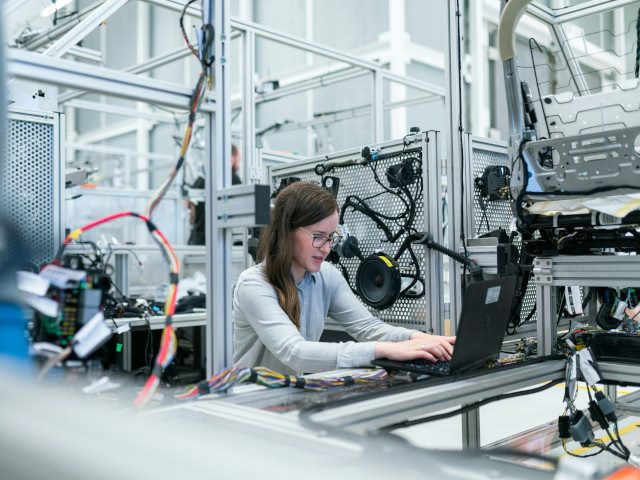Manufacturing is often listed as a use case for artificial intelligence (AI) and machine learning (ML) applications, but there’s not always a lot of detail on how to work with AI in manufacturing. And if you’re looking to gain expertise on how to apply AI to your production line, you don’t want to find yourself in the wrong type of AI class. Here, we look at some AI certificates that can help you get your manufacturing humming along smarter and faster.
1. AI in Manufacturing
Certifying Organization: TU Delft
Skills Learned: This certificate course provides an overview of how AI can be used in classification, predictive maintenance and optimizing processes, with a case study for each topic. The course also includes information on costs and benefits for AI projects, ethical issues around AI and where AI is likely to be headed in the next five to 10 years.
Requirements: Experience in manufacturing is highly recommended
Duration: Six weeks, four to five hours a week
Test: Quizzes, six assignments and discussions; you must score at least 75% to pass
Cost: Currently 875 euros
2. Robotics in Manufacturing Fundamentals
Certifying Organization: Society of Manufacturing Engineers
Skills Learned: This is an introductory certificate for people who want to upskill or reskill. It includes an introduction to manufacturing, applied mathematics, robotic applications, robot systems and components and robot programming concepts.
Duration: 60 minutes
Test: An exam
Cost: $125 for employed people, $75 for college students or unemployed people
3. Artificial Intelligence in Manufacturing Process
Certifying Organization: Udemy
Skills Learned: The course consists of seven parts, including an introduction to AI in manufacturing, how to start, how AI improves productivity, risk mitigation, sustainability and data analysis.
Duration: 2.5 hours
Cost: Currently $19.99
4. Artificial Intelligence IT Certificate
Certifying Organization: Columbus State Community College
Skills Learned: The first 18 weeks of the program is about AI in general, and the last 12 weeks can be on either natural language processing (NLP) or manufacturing. The manufacturing component covers quality monitoring, predictive maintenance, demand forecasting, ethical concerns and the application of the AI project cycle to manufacturing.
Requirements: Working knowledge of relational databases, SQL and Python programming
Duration: 30 weeks, one night a week
Test: Group capstone project and development of individual learning portfolios
Cost: Currently $2,600
5. AI Engineering Fundamentals: Mechanical Engineering
Certifying Organization: Carnegie Mellon University
Skills Learned: The certificate includes two main courses. Machine Learning & Artificial Intelligence for Engineers and Introduction to Deep Learning. You must pass both classes to earn the certificate. It is intended to teach mechanical engineers how to use AI to automate repetitive tasks, optimize designs, make predictions, improve quality control and advance product design.
Requirements: A mechanical engineering degree or experience as a mechanical engineer is recommended as is experience with a scientific programming language, such as Python
Duration: Nine months. One weekly one-hour evening session with a second optional one-hour weekly recitation session.
Cost: Currently $16,968 and a $225 technology fee each semester
6. C-104 Certified Industry 4.0 Associate IV: IIoT, Networking & Data Analytics
Certifying Organization: Smart Automation Certification Alliance
Skills Learned: This certificate is intended for IT professionals and technicians wanting to learn the basics of industry 4.0 automation, such as the industrial internet of things, smart sensors and devices, networking and data analytics software. The organization also offers a wide variety of other manufacturing certificates in other areas, such as robotics.
Duration: Varies
Test: An exam
Cost: Member companies certify their employees for free
7. AI for Computational Design and Manufacturing
Certifying Organization: Edureka
Skills Learned: This course covers an introduction to AI, including generative AI and advanced manufacturing with AI. It also covers AI in supply chain management, process optimization, quality control, predictive maintenance, data analysis, optimization, predictive modeling and moral AI applications.
Duration: Two weeks of live weekend classes online
Test: Quizzes, projects and assignments
Cost: Currently $269
8. Manufacturing Innovation With AI
Certifying Organization: Quality 4.0
Skills Learned: This course covers topics such as feature engineering, manufacturing problem solving using machine learning algorithms, such as Random Forest, and using multiple classifier systems to optimize prediction.
Requirements: Passing the organization’s Yellow Belt and Green Belt classes as well as a basic understanding of probability, statistics, linear algebra and programming
Duration: Nine weeks
Test: Certification requires working with an assigned mentor on a project
Cost: Currently $399.99 for the online course, $1,499.99 to begin the certification process
9. Professional Certificate Program in Design & Manufacturing
Certifying Organization: MIT Professional Education
Skills Learned: At MIT, you can get a manufacturing certificate that includes AI courses. The AI courses include AI for computational design, imaging and ML and ML for materials as well as electives on computer vision, neural networks on internet of things devices and using AI to solve complex problems.
Requirements: Some classes require a bachelor’s degree and three years of experience
Location: Online and some classes on campus
Duration: Each class lasts two to five days; a total of 16 days is required for the certificate
Cost: Currently ranges from $2,500 to $4,700 a class and a $325 application fee for the certificate
10. AI in Production Engineering
Certifying Organization: Technical University of Munich Institute for LifeLong Learning
Skills Learned: This certificate is all about the data. You’ll learn about where to get data, how to clean it up and deal with missing or redundant data, how to transform it into something usable, how to use it for mining and modeling and how to interpret the outcome of ML models — all using real-world examples.
Requirements: Students should have an academic background in STEM subjects or a business degree with a quantitative focus (e.g., econometrics, operations research) and two to five years of professional experience. Basic programming experience in Matlab or Python is recommended (an online refresher tutorial offered).
Location: Garching, Germany
Duration: Three days
Test: A final exam
Cost: Currently 1,080 euros
